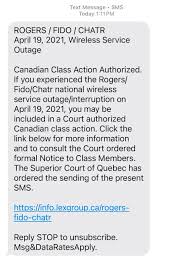Rogers and Fido Face Class Action Lawsuit Over Outages

Introduction
The recent service outages experienced by Rogers and Fido customers have raised significant concerns regarding the reliability of telecommunications services in Canada. This situation has not only affected millions of users but has also led to a class action lawsuit aimed at holding the companies accountable. Understanding this legal action is crucial for all affected customers seeking compensation and clarity regarding their service disruptions.
Details of the Outage
In July 2022, Rogers Communications experienced a nationwide outage that left approximately 10 million customers without access to phone services, internet, and emergency calls for over 18 hours. Fido, a subsidiary of Rogers, was greatly impacted as well. The outage sparked widespread frustration, with customers reporting disruptions to essential services, lost income, and safety concerns.
The outage was attributed to a network malfunction that originated from a software update gone wrong, according to company officials. As the situation progressed, both Rogers and Fido announced they would conduct internal investigations and issued public apologies for the inconvenience caused.
The Class Action Lawsuit
In response to the service issues, a class action lawsuit was filed on behalf of the affected customers. The lawsuit claims that both Rogers and Fido have breached their contractual obligations by failing to provide adequate service, which the plaintiffs argue is not just a minor inconvenience but a significant disruption that has had lasting effects on users’ daily lives.
Legal experts believe that the lawsuit could lead to substantial compensation for customers if successful. They argue that the situation highlights the need for telecommunications providers to ensure adequate infrastructure and response systems to prevent future outages.
Reactions and Future Implications
The news of the class action has garnered attention from various consumer advocacy groups, which see it as a necessary step towards holding large corporations accountable. Many customers have expressed hope that this lawsuit will not only provide them with compensation but also encourage telecommunications companies to improve their service standards, thereby minimizing the risk of similar incidents in the future.
As the lawsuit progresses, affected customers are encouraged to stay informed about their rights and any developments related to the case. Experts suggest that depending on the outcome, this lawsuit could set a precedent for how telecommunications companies operate and respond to service complaints in the future.
Conclusion
The class action lawsuit against Rogers and Fido signifies a growing awareness among consumers regarding their rights and the reliability of services they pay for. As the case unfolds, it could lead to important changes in the industry and become a pivotal point in the ongoing dialogues surrounding consumer protection and corporate accountability in Canada.

